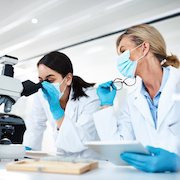How Do Genetic Mutations Impact a CLL Patient’s Prognosis?
How Do Genetic Mutations Impact a CLL Patient’s Prognosis? from Patient Empowerment Network on Vimeo.
What is the best approach for chronic lymphocytic leukemia (CLL) patients with genetic mutations? CLL expert Dr. Seema Bhat shares how mutations impact prognosis and treatment.
Seema Bhat, MD is a hematologist at The Ohio State University Comprehensive Cancer Center – The James. Learn more about Dr. Bhat.
Related Resources:

|

|

|
Transcript:
Katherine:
Okay, that’s great. Here’s one from Phil, “How do mutations affect longevity when surviving CLL? What new treatments help with P53 mutation?”
Dr. Bhat:
So, there are certain prognostic markers for CLL, meaning certain tests that can tell us how a particular patient is expected to do. Some of these tests detect presence or absence of mutations in certain genes. For example, the IGHV gene can be mutated or unmutated.
In patients with mutated IGHV, they do well, and patients with unmutated IGHV tend to have a more aggressive disease and may require treatment sooner. Similarly, TP53 mutations also tend to require treatment sooner, and more of these mutations do not respond well to conventional chemotherapy. However, targeted therapy has changed the outlook for these mutations, and it works very well for both these mutations.






